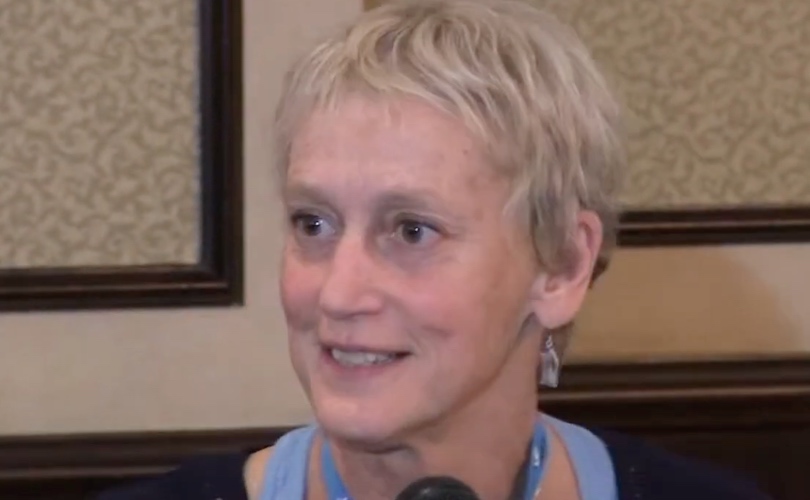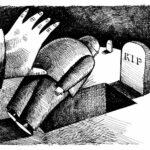Canadian Politics, MAiD / Euthanasia
Canadian euthanasia doctor gushes about how much she enjoys killing people
In the recently released BBC documentary Better Off Dead?, disability rights activist Liz Carr interviewed Dr. Ellen Wiebe, Canada’s most notorious euthanasia doctor. Wiebe is also an abortionist and an activist with Dying With Dignity, the euthanasia lobby group seeking to expand eligibility for assisted suicide in Canada even further. Wiebe’s attempted defence of Canada’s euthanasia regime backfired when throughout her interview, she laughed and smiled as she discussed ending the lives of patients.
“I love my job,” she told Carr. “I’ve always loved being a doctor and I delivered over 1,000 babies and I took care of families, but this is the very best work I’ve ever done in the last seven years. And people ask me why, and I think well, doctors like grateful patients, and nobody is more grateful than my patients now and their families.” Her euthanasia patients, it must be noted, are dead. As one disturbed watcher noted on social media: “Enjoying her job a little too much, I felt.” Many others concurred.
Carr pushed Wiebe several times on the threat euthanasia poses to vulnerable populations, but Wiebe was having none of it. “I’ve certainly met people who are no more disabled than I am saying that life is not acceptable in this state,” she said. “And I would say, ‘Hm, you and I are different.’ But not different in the sense of wanting to have some control.” Carr responded: “For me, I’m concerned that giving the option and the right to a group of people puts another group of people at risk. But I don’t feel you see that as a worry.”
Carr is right. “What you’re saying is to protect what you consider vulnerable people you are condemning others to unbearable suffering,” Wiebe said. “But I am so glad, so glad that I’m a Canadian and that we have this law so that people can choose that or not choose that. But to say that somebody has to suffer like that is simply cruel.” In short, Wiebe rejects the case made by disability rights groups that they are vulnerable, and that social pressure and even coercion often accompanies euthanasia.
According to a long report published in The New Atlantis by Alexander Raikin titled “No Other Options,” a suicidal man who was told he was ineligible because he had no serious illness and lacked “the capacity to make informed decisions about his own personal health” was cleared by Wiebe, who flew him to Vancouver and killed him there. “It’s the most rewarding work we’ve ever done,” Wiebe told fellow physicians in 2020. Wiebe has defended expanding eligibility for euthanasia for those who suffer only from mental illness.
And then there is Wiebe’s response in a MAiD seminar, answering the question of what doctors should do with a patient who appears to be resisting euthanasia. She suggested, with chuckles, that the patient be sedated. Watch for yourself:
In 2017, Dr. Ellen Wiebe sneaked into a Jewish nursing home that does not permit euthanasia to give a lethal injection to an 83-year-old man. The event understandably terrified Holocaust survivors in residence at the home, and the appalled staff brought a complaint against Wiebe to the College of Physicians and Surgeons of British Columbia. The complaint against her was dismissed on the basis that MAiD is legal in Canada, and that thus Wiebe had not broken the law.
It is interesting that so many people were so uncomfortable by the glee Wiebe expressed about her work. Even many who support euthanasia felt that she should be more solemn and thoughtful about it, somehow. But why? If euthanasia—killing—is healthcare, why should she not cheerily dispatch her patients? Perhaps the discomfort in her cheery demeanor—the fact that she finds ending lives rewarding on both ends of life’s spectrum—is because we know, deep down, that there is something profoundly wrong about the normalization of medicalized killing. That discomfort just might be the conscience speaking. We should listen closely.









I thought doctors were meant to help? This is like wanting to burn someone’s house down and calling a firefighter to come and do it for you!
I think these people are demonic, they are possessed. And the look in her eyes when she gushes about this and laughs, looks psychopathic!
I personally am horrified how this person can call themselves a caregiver.
Why would you ever want to die on a pho leather sofa, staring up at fluorescent lights, white walls and this horrible creature putting you to death like a dog! Oh, I’m so infuriated !!!!
Where were you in 1968 when this all started in Canada. We saw the seeds planted in the 1920’s – ’30s with Eugenicists like Tommy Douglas.